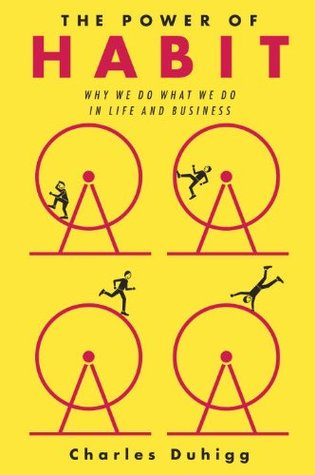More on this book
Community
Kindle Notes & Highlights
Habits, scientists say, emerge because the brain is constantly looking for ways to save effort. Left to its own devices, the brain will try to make almost any routine into a habit, because habits allow our minds to ramp down more often. This effort-saving instinct is a huge advantage. An efficient brain requires less room, which makes for a smaller head, which makes childbirth easier and therefore causes fewer infant and mother deaths. An efficient brain also allows us to stop thinking constantly about basic behaviors, such as walking and choosing what to eat, so we can devote mental energy to
...more
Andrew Gapic liked this
This process within our brains is a three-step loop. First, there is a cue, a trigger that tells your brain to go into automatic mode and which habit to use. Then there is the routine, which can be physical or mental or emotional. Finally, there is a reward, which helps your brain figure out if this particular loop is worth remembering for the future:
He created a craving. And that craving, it turns out, is what makes cues and rewards work. That craving is what powers the habit loop.
First, find a simple and obvious cue. Second, clearly define the rewards.
Cravings are what drive habits. And figuring out how to spark a craving makes creating a new habit easier.
Rather, to change a habit, you must keep the old cue, and deliver the old reward, but insert a new routine.
Belief was the ingredient that made a reworked habit loop into a permanent behavior.
But we do know that for habits to permanently change, people must believe that change is feasible.
Golden Rule of habit change is applied: If we keep the same cue and the same reward, a new routine can be inserted.
The evidence is clear: If you want to change a habit, you must find an alternative routine, and your odds of success go up dramatically when you commit to changing as part of a group. Belief is essential, and it grows out of a communal experience, even if that community is only as large as two people.
Dozens of studies show that willpower is the single most important keystone habit for individual success.5.1
Willpower isn’t just a skill. It’s a muscle, like the muscles in your arms or legs, and it gets tired as it works harder, so there’s less power left over for other things.”
“That’s why signing kids up for piano lessons or sports is so important. It has nothing to do with creating a good musician or a five-year-old soccer star,” said Heatherton. “When you learn to force yourself to practice for an hour or run fifteen laps, you start building self-regulatory strength. A five-year-old who can follow the ball for ten minutes becomes a sixth grader who can start his homework on time.”5.13
This is how willpower becomes a habit: by choosing a certain behavior ahead of time, and then following that routine when an inflection point arrives.
Whether selling a new song, a new food, or a new crib, the lesson is the same: If you dress a new something in old habits, it’s easier for the public to accept it.
to sell a new habit—in this case exercise—wrap it in something that people already know and like, such as the instinct to go places where it’s easy to make friends.
However, to modify a habit, you must decide to change it. You must consciously accept the hard work of identifying the cues and rewards that drive the habits’ routines, and find alternatives. You must know you have control and be self-conscious enough to use it—and every chapter in this book is devoted to illustrating a different aspect of why that control is real.
“All our life,” William James told us in the prologue, “so far as it has definite form, is but a mass of habits—practical, emotional, and intellectual—systematically organized for our weal or woe, and bearing us irresistibly toward our destiny, whatever the latter may be.”9.29
If you believe you can change—if you make it a habit—the change becomes real. This is the real power of habit: the insight that your habits are what you choose them to be. Once that choice occurs—and becomes automatic—it’s not only real, it starts to seem inevitable, the thing, as James wrote, that bears “us irresistibly toward our destiny, whatever the latter may be.”


